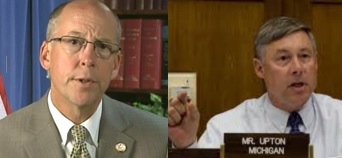 Wall Street Journal Opinion by Oregon Congressman Greg Walden and Michigan Congressman Fred Upton (10/16/13).
Wall Street Journal Opinion by Oregon Congressman Greg Walden and Michigan Congressman Fred Upton (10/16/13).
President Obama is damaging the economy in a number of ways, but one often overlooked infliction is regulatory uncertainty. The administration has been unclear, to put it charitably, about how it plans to regulate entire sectors of the economy. And it’s killing jobs, hurting the middle class, and limiting the country’s potential for growth.
Almost daily, the administration announces new plans to unilaterally alter the legal landscape of American business, tweaking agency rules or coming up with new ones. Complying with each of these changes costs money, which discourages a company from hiring workers and hurts productivity. But on a broader level, this kind of ad hoc approach to regulating indicates that the president doesn’t understand what growth requires. The United States has spent the past five years—Mr. Obama’s entire presidency—in the economic doldrums because the country’s leader can’t connect the dots between federal regulatory actions and entrepreneurial investment decisions.
Let’s begin with a recent example.
On Sept. 26, the Federal Communications Commission adopted a Notice of Proposed Rulemaking outlining potential new media-ownership rules that eliminate the so-called UHF discount. The change would affect how the FCC determines whether a station owner has approached a 39% cap on nationwide audience that can be reached by a single owner.
The proposed FCC rules aren’t just complicated. They won’t even be final until next year at the earliest because the FCC can take however long it sees fit—sometimes more than a decade—to promulgate rules. Even worse, the commission says whatever rules the FCC dreams up in the future will be applied retroactively. So between now and when the new guidelines become final, no one knows the rules of the game. And companies have to be prepared at all times to adhere to a new set of regulations that are still a glimmer in the FCC’s eye. This leaves one of the economy’s only flourishing industries at the mercy of bureaucrats in Washington.
The FCC actions are just the latest example. Last month, the Obama administration proposed severely restrictive rules on greenhouse-gas emissions for new power plants. Next year the administration will follow up with regulations for existing power plants. Together, these two salvos are expected to prevent construction of new power plants and shut down existing plants, destroying jobs in the manufacturing, coal-mining and rail industries. Consumers will foot the bill through higher energy bills.
The energy sector has innumerable other examples. The White House boasts that it increased domestic oil and natural-gas production over the past several years—oil production alone increased by nearly a million barrels daily last year, and natural-gas production, thanks to hydraulic fracturing, is at the its highest in U.S. history. Yet a Congressional Research Service report from earlier this year found that since 2007, natural-gas production on federal lands fell by 33%. Oil production last year on federal land was below the 2007 level. The energy boom has occurred despite the president’s best efforts, with states leading the way in accommodating drilling on private and nonfederal land.
Worst of all, in the Obama regulatory onslaught, is the red-tape jungle called the Affordable Care Act. How many small businesses in America aren’t hiring simply because they want to stay under the 50-person cap that triggers the law’s employer mandate? And how many larger businesses have constrained their growth because adding new workers means additional ObamaCare mandated health-care costs? In June, the administration delayed implementation of the employer mandate for a year, but businesses know the regulations are headed their way.
The president shrouds his regulatory barrage with good intentions. His goals—such has improving health care and developing energy alternatives—are noble in theory. But his real-world approach has failed. Mr. Obama may believe that he’s just fine-tuning policy as the economy slowly recovers, but he frustrates job growth and prosperity every time he tinkers.
There’s a simple solution to this mess: Create clear rules that are predictable and applied equally to everyone. Let companies know what to expect. That will allow entrepreneurs to make decisions based on good information instead of wasting time trying to read the minds of regulators.
Mr. Upton, a Republican, represents Michigan’s sixth congressional district and is chairman of the House Committee on Energy and Commerce. Mr. Walden, a Republican, represents Oregon’s second congressional district.
Disclaimer: Articles featured on Oregon Report are the creation, responsibility and opinion of the authoring individual or organization which is featured at the top of every article.

